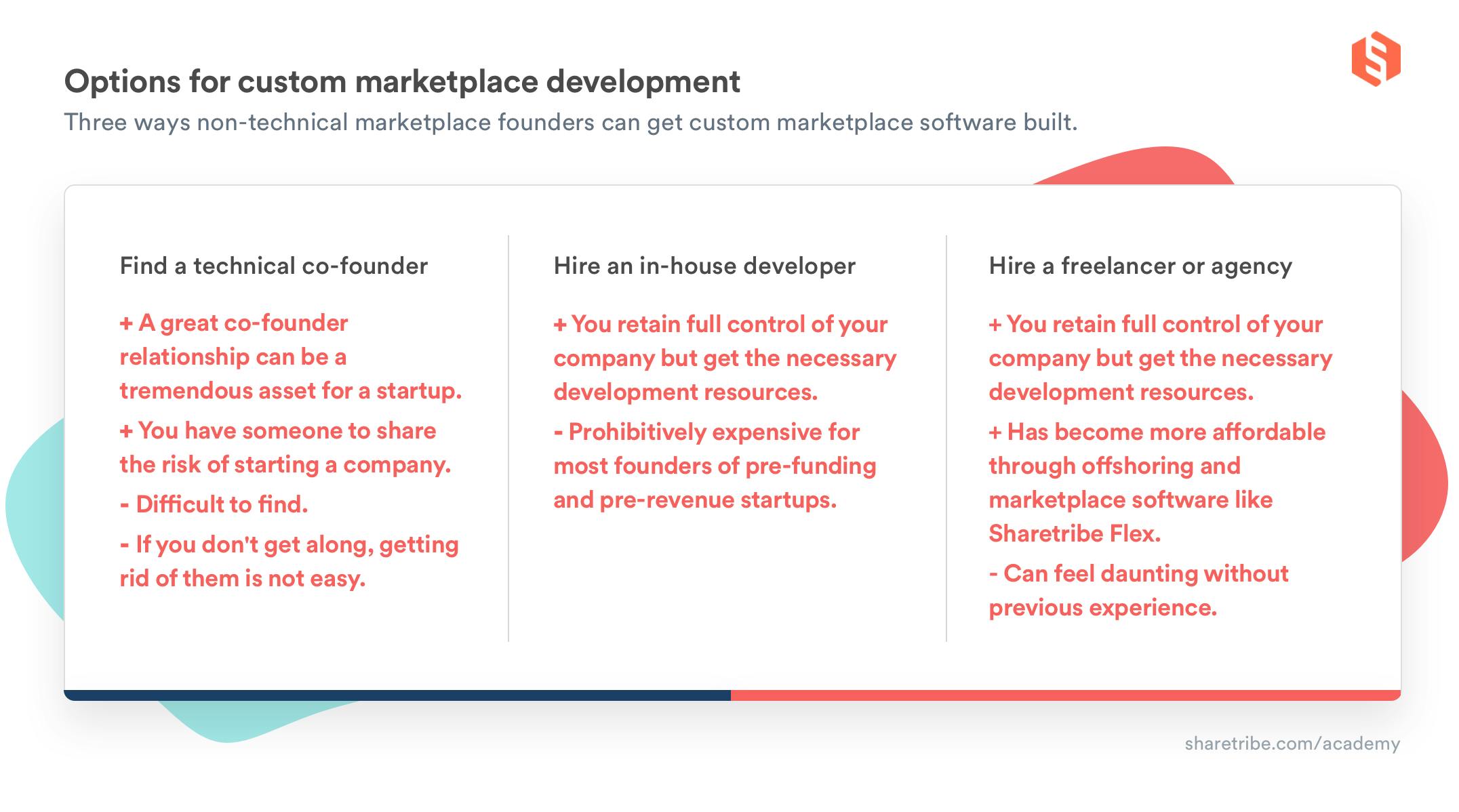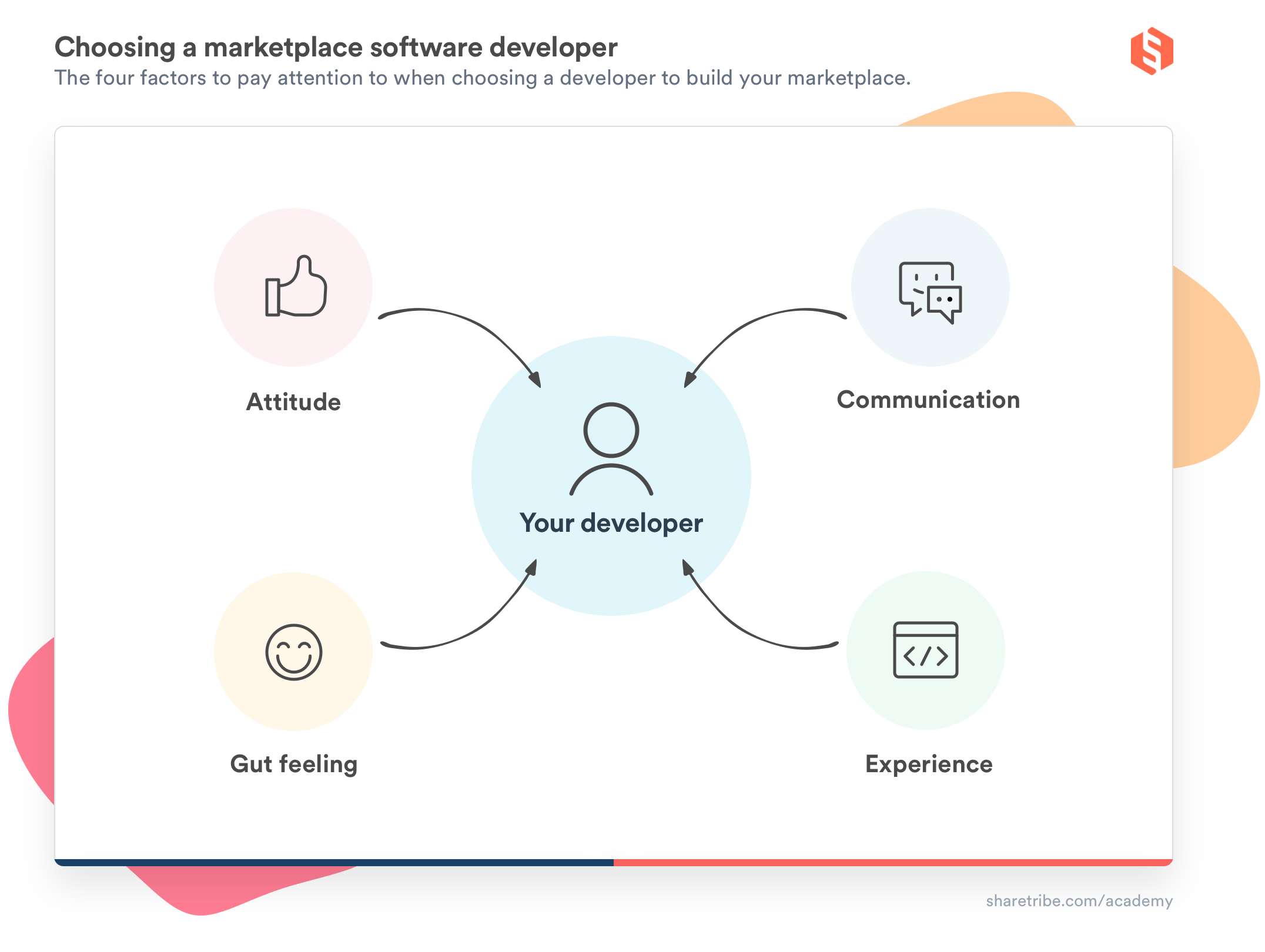How to hire a software developer to build your marketplace
Most marketplaces will eventually need custom software development to reach their goals. Figure out if it's time for your to find a marketplace developer and, if yes, how to find the right one.
Published on
Last updated on

No-code marketplace software solutions are getting better by the year. Still, most successful marketplace businesses will require custom software development sooner or later. If you haven't worked with developers before, this can seem like a daunting prospect.
But once you know the basics, hiring a developer can be a straightforward and delightful experience. This article series covers those basics and helps you succeed in getting custom marketplace software built affordably and efficiently.
In this first article, I'll help you figure out whether you need to hire a developer or not. And if yes, help you find the right developer.
In the second article, I'll discuss the process of describing your requirements to a developer. Your goal is to reach a high price-quality ratio for your software with as little time and resources as possible.
Many people believe that if you are building a software company, you need custom software from the get-go. I've spoken to many aspiring founders who feel they can't start their business unless they find a technical co-founder. Or that it'll be impossible for them to find an investor without software of their own.
These are incorrect assumptions. Many marketplace founders have launched successful businesses and raised significant funding without writing a single line of code.
In fact, in many situations, writing custom code can do you more harm than good. You should always start by at least validating your marketplace idea before building anything. Modern software-as-a-service tools make it easier than ever. Your first Minimum Viable Platform might be a simple landing page with a form for users to provide information and you manually matching supply and demand in the background.
Using a no-code marketplace software tool is also a good option. They help you launch a fully automated digital marketplace without any custom development.
However, I've noticed recently that some people have unrealistic expectations for no-code software. They believe that software development should no longer be needed at all. Though I'm a big believer in the no-code movement (after all, Sharetribe launched the first no-code marketplace builder back in 2014), during the past nine years, I've come to realize that no-code has its limits. I have yet to see a truly successful online marketplace scale up the business without engaging in some custom software development.
Eventually, you will want to build functionality that is completely unique to your platform and goes beyond the capabilities of the no-code platform you use. It could be a machine learning algorithm for matching supply and demand, a dynamic pricing calculator that updates listing prices based on customer behavior, or an integration with industry-specific third-party software.
And sometimes, your Minimum Viable Platform already needs custom software. For example, if you're targeting a market with large existing players and your competitive advantage over them is a unique software design approach, you cannot avoid custom development.
If you're in either of these situations, it's time to find a developer who can help you realize your vision.
You have three approaches to finding a software developer. These are:
- Finding a technical co-founder.
- Hiring an in-house developer (or a team of developers).
- Hiring a freelance developer or agency.
Each option has its pros and cons, which I'll elaborate on next.
If you come across a developer who is interested in becoming your technical co-founder, it can be a good solution. Having someone on your team with technical expertise is a great asset, and you would get a custom software product without considerable upfront investment.
However, there are risks too. A functioning co-founder relationship is vital for the success of any startup company. You don't want to engage in such a relationship with a person you just met. In a few months, you might realize you don't get along, and by that time, your co-founder holds significant equity in your company.
It can also be quite challenging to find a technical co-founder. Some aspiring non-technical founders I've met have spent years searching for one. They could have spent that time finding ways to launch their marketplace on their own.
Your next option is to hire an in-house developer or a team of developers. It can be a great choice if you have funding or if you already have a sustainable source of revenue. You retain full control of your business but get the development resources you need. In most cases, though, this approach is still prohibitively expensive for pre-funding and pre-revenue startups.
In most situations, hiring a freelancer or an agency to build your marketplace is the right choice. Some people find this intimidating because they think it will cost a fortune and expect it to be out of their grasp without external funding. That doesn't have to be the case. Two recent trends in software development have significantly lowered the cost of freelance marketplace development:
- The emergence of marketplace software solutions like Sharetribe. Sharetribe allows you to launch a platform with all the unique features and workflows you need with 10% to 20% of the time and money required to build a similar platform from scratch. In addition, you can launch and validate your marketplace with Sharetribe completely no-code and only choose marketplace development later when you're ready to start building custom functionality.
- The proliferation of offshore and nearshore development. Today, it's easy to hire a developer anywhere in the world. Many agencies and freelance developers from Sharetribe's Expert Network estimate the typical cost for launching a custom marketplace with Sharetribe is no more than $5000-$10.000. Of course, it's still a lot of money but doesn't always necessitate an outside investment. And if you're looking to add one feature or two or change your visual design, it's possible the required budget will be even lower.
The rest of this article focuses on how to find the right freelancer or agency to build your marketplace platform.

The startup world is full of tales of outsourcing software development going awry. These stories have made many founders suspicious of developers. We witnessed this firsthand when we first introduced Sharetribe Flex, a predecessor of the current Sharetribe marketplace software, in 2018: many people we talked to felt that finding a reliable developer was simply too difficult.
Luckily, several developer marketplaces, like Upwork and Sharetribe customer SoftwareSupp, have since emerged to tackle this issue. Such platforms typically pre-screen or vet their providers. In addition, they offer review systems where people can see what other customers have thought of a developer’s work.
One challenge with these platforms, though, is that the reviews can sometimes lack context. For example, a freelancer might be offering three services: WordPress blog configuration, Shopify online store configuration, and custom software development. While they may have a promising number of positive reviews, all the reviews might be about the first two services and from extremely simple projects. This freelancer might not be capable of handling a more complex software development project.
At Sharetribe, we decided to solve this challenge by building our own marketplace for hiring marketplace developers, the Sharetribe Expert Network. All Experts in our network go through a validation process in which they build real code with Sharetribe. We then review the quality of the code and, based on that, decide if they qualify for the Network. Once they are in the Network, we frequently reach out to the founders they're working with for feedback on the quality of their work. If an Expert fails to provide a sufficient level of service to founders, they are removed from the network.
While marketplaces like Expert Network make it easier to find trustworthy developers, you are still faced with a choice: which one of these freelancers or agencies is the right one for me?
I encourage you to always talk to several developers before making a choice. My personal preference is to have the conversations over a video call. If that is an option for you, it can provide some helpful additional cues.
Pay attention to the following factors when choosing a developer:
- Attitude. What's their response time? Do they return your emails fast? Is it easy to find a time slot for a call or live chat? Answers to these questions tell you whether the developer truly has the capacity and interest to work with you.
- Communication. Do you understand everything the developer tells you? Do you feel they understand your vision and requirements? Smooth communication is critical for the success of the project. Misunderstandings can be costly.
- Experience. Are they able to demonstrate that they've completed similar work in the past? Having lots of experience is a plus, but it often comes with a premium price. A more junior developer might be happy to offer you a lower rate to build their portfolio. This can be a great deal, even if it takes them a bit longer to complete the work.
- Gut feeling. I'm a big believer in the power of intuition. Pay attention to how you're feeling immediately after meeting a potential developer. Is this someone you'd enjoy working with or not?

In addition to these factors, price plays an important role. How much will the developer charge for building what you need? To get an estimate, you need to describe your requirements to the developer as accurately as possible. That's the topic of the next article in this series.
You might also like...

How to describe your requirements to a marketplace developer
Before you can start developing your marketplace platform, you need to describe it to your developer.

Online marketplace design: the 5 principles of a great marketplace UX
Five key online marketplace design principles and tons of practical tips and examples. Courtesy of marketplace UX designer Fiona Burns.

Marketplace software: How to compare and choose the best solution
There are dozens of online marketplace software alternatives to choose from. Learn how to make the right choice for your marketplace idea.
Start your 14-day free trial
Create a marketplace today!
- Launch quickly, without coding
- Extend infinitely
- Scale to any size
No credit card required
